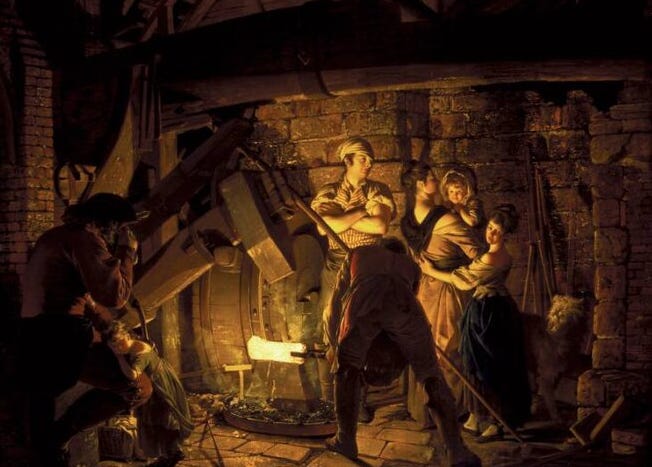When you want to let your readers know that your characters are no longer in the fields they know, your only way to do so in prose is, of course, language.
But above and beyond a character observing he's not in Poughkeepsie any more, or a character in a different story watching the pig fly and wondering if there will be rain, there is the use of language to suggest a world. Loading the language works toward that end1, with the added advantage that this actually works better when the viewpoint character is from the world, and not a stranger who hopped through a portal. (This is not a common trait among world-building rhetorical tricks.)
The first is the use of terminology. You want to avoid modern terminology. Have your characters speak of knowledge, not information, and certainly not data. Favor words that are less fashionable at the moment: pupil or scholar rather than student, clerk rather than secretary.
Actually archaic words -- jarl rather than lord, karl rather than (free)man -- are perilous, though in certain stories, you may wish to make the tradeoff between baffling some readers and conveying a very strange world.
Still more perilous are words that have shifted meaning. An earl is no longer some kind of nobleman, of any conceivable power and honor between the royal family and the commoners -- or churls. Using churl for commoners may convey the contempt the viewpoint earl has for them, but the reader may misjudge how much of it is their lowliness and how little is their lack of courtesy.
On the flip side, if a character notes that an earl is discourteous, and a churl is courteous, rather than impolite and polite or uncivil and civil, it's a wise choice because the point is that the country bumpkin has not been to court, rather than to the city. It has only subtle effects on the reader, who may not notice the distinction.
There is no substitute for an ear here, and there is no real way to acquire it except by reading old books. Enough old books that you realize that Jane Austen would never have phrased something that way. The effect you are looking for is not so much old (except when you want to evoke a specific era) as timeless.
Effect is more important than historical accuracy. You will not lose much in effect if your medieval characters refer to violet -- not the flowers -- or orange -- not the fruits -- or pink -- not the flowers. Some art is in fact required to deal with it if you do choose to evade the basic color terms that were acquired so late we know their sources. Both orange and pink would have been called red in the medieval age, which will give a wrong impression, and so you have to cast about and refer to them as, perhaps, coppery or the shade of apple-blossoms.
All the more in that historical accuracy can trip you up. Cleric is an old and venerable term. Use it in fantasy, and everyone who's played D&D will think of the game, not the medieval era.
More fraught than those are metaphors. You can argue that if a word rings a bell for the reader that it's merely a translation. But if you use "rings a bell" you came from the twentieth century at the earliest.
Avoiding modern day metaphors helps on the negative side of avoiding jars to the reader's view. But what really helps is metaphors in era.
Delicacy is required, to avoid falsifying the character's viewpoint. A young knight speaking of his beloved as a red, red rose is natural, but he could describe the glitter of the sea under the sun as like a company of knights riding to tourney.
Ensure that your viewpoint character compares things to things that are reasonably close to hand. A medieval heroine in a reasonably soggy country would not think of a man in a desert seeing water. She might, on the other hand, compare something to storm-tossed mariners who spot land, a traveler caught by snow who sees light, a peasant who sees a rainstorm in drought, and many more things. To have her think of the man in the desert is not only out of character, but misses a chance to build the world.
while still doing the other things loading the language does, like
Put Your Words To Work
Description is something all writers have to wrestle with. Once I heard a writer asking how to make his prose more cinematic.






Something that I need to work on. Thanks.